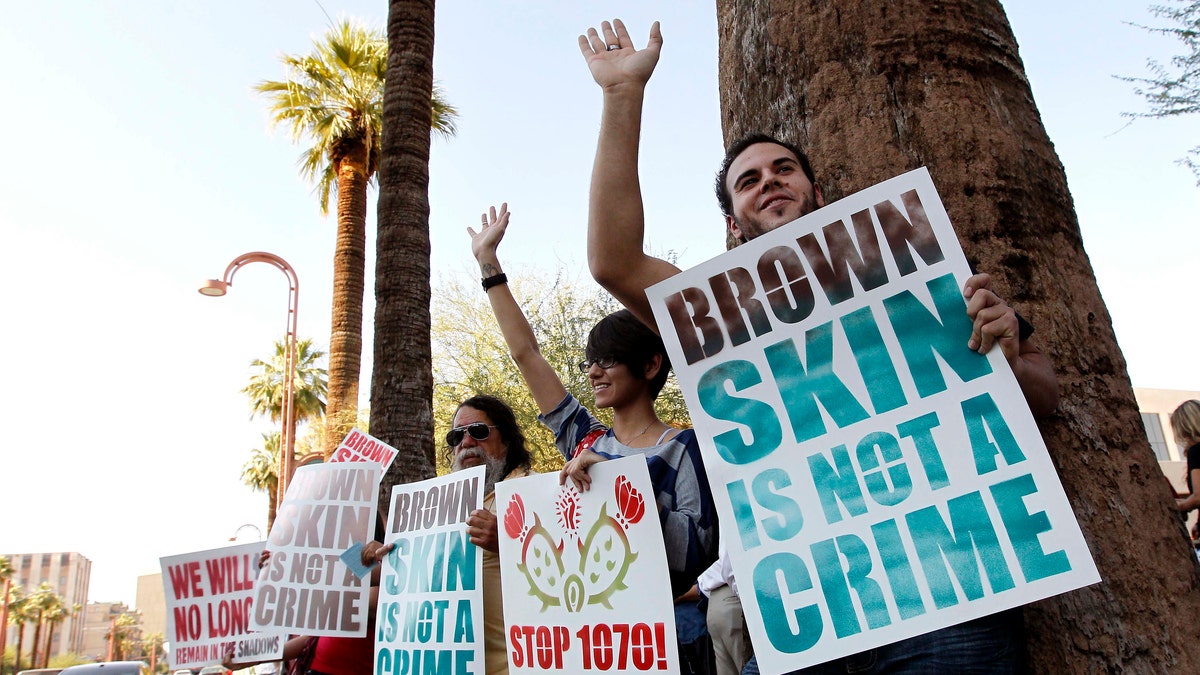
Laurent Taillefer, right, and Andrea Begay, second from right, both of Phoenix, wave at cars as they honk their horns driving by as the two join immigration rights protesters as they gather after the United States Supreme Court decision regarding Arizona's controversial immigration law, SB1070, at the local U.S. Immigration and Customs Enforcement offices Monday, June 25, 2012, in Phoenix. The Supreme Court struck down key provisions of Arizonaâs crackdown on immigrants Monday but said a much-debated portion on checking suspectsâ status could go forward. (AP Photo/Ross D. Franklin) (AP2012)
The Supreme Court declined to hear an appeal, at the request of Arizona Gov. Jan Brewer, over a part of Arizona’s immigration law that would call on police to arrest people who harbor undocumented immigrants.
The justices had no comment Monday on their order declining to review a ruling that blocked enforcement of that part of Arizona's 2010 immigration law.
The 9th U.S. Circuit Court of Appeals found last year that the harboring ban was vague and trumped by federal law, which already prohibits the harboring of people who aren't in the country legally.
The harboring ban was in effect from late July 2010 until a federal judge in Phoenix blocked its enforcement in Sept. 2012 as part of a challenge by civil rights groups.
Immigrant rights advocates challenging the 2010 law told the nation's highest court that none of the country's federal appeals courts have upheld a similar state law.
Brewer's attorneys had argued that the 9th Circuit Court of Appeals' decision was flawed because a state can make a federal violation of law a state crime.
The state's harboring ban was overshadowed by other parts of the law, including a requirement that police officers, while enforcing other laws, question the immigration status of those suspected of being in the country illegally.
In 2012, the U.S. Supreme Court upheld the questioning requirement but struck down other sections of the law, such as a requirement that all immigrants carry immigration registration papers.
Known as the "show me your papers" provision, it requires state and local police to perform roadside immigration checks if a "reasonable suspicion" exists that someone is in the country illegally.
In pushing for the right to enforce its own immigration laws, Arizona state officials said that the federal government had failed in its responsibility to secure the borders and control illegal immigration, and that states – particularly those on the border – were forced to deal with the consequences of people living here unlawfully and usurping state resources.
An estimated 11 million people live in the United States illegally — most of them are Latinos and roughly half are visa overstays.
Arizona's move toward implementing its own immigration law set in motion similar efforts by lawmakers in other states frustrated by illegal immigration.
Last month, the Supreme Court declined to hear other cases brought forwarded by officials of towns in Texas and Pennsylvania who want laws that would, for instance, penalize landlords for renting to people who are in the country illegally.
The Associated Press contributed to this report.
Follow us on twitter.com/foxnewslatino
Like us at facebook.com/foxnewslatino




